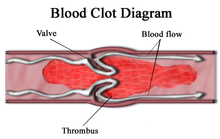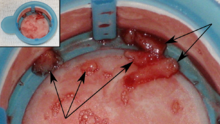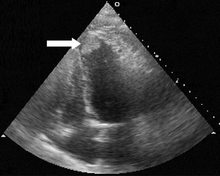- Thrombus
-
Thrombus (Plural Thromben; von griechisch θρόμβος thrómbos, „Klumpen, Pfropf“; Coagulum) ist der medizinische Begriff für einen Blutpfropf (z. B. ein Blutgerinnsel) in einem Blutgefäß. Dagegen wird für das extravasale Blutgerinnsel der Begriff Koagulum verwendet. Thromben können sowohl im venösen als auch im arteriellen Teil des Blutkreislaufs entstehen. Ein Thrombus kann das Gefäß als festsitzender Thrombus an seiner Entstehungsstelle verstopfen, oder er kann sich lösen, vom Blutstrom mitgerissen werden und an anderer Stelle Verstopfungen verursachen, die dort zum Ausfall der Blutversorgung von Organen führen. In diesem Fall spricht man von einer Embolie oder Thrombembolie, das Blutgerinnsel wird dann auch als Embolus bezeichnet.
Die von Thromben ausgelösten Krankheitsbilder sind unter anderem der Infarkt, die Thrombose oder in deren Folge die Lungenembolie.
Thromben bilden sich nach Gefäßverletzungen, durch Störungen der Blutgerinnung (Hämostase) oder bei stark verlangsamter Fließgeschwindigkeit des Blutes. Im letzten Fall können sich Thromben auch spontan und ohne vorhergehende Verletzung oder andere äußere Einflüsse bilden. In vielen Fällen werden Thromben vom gesunden Körper selbst wieder völlig aufgelöst ohne zu den o. g. Krankheitsbildern zu führen. Bei der Obduktion muss der Pathologe in vivo entstandene Thromben von einem Leichengerinnsel unterscheiden. Letzteres lässt sich ohne weiteres aus dem betroffenen Gefäß herausziehen, da es mit der Gefäßwand nicht verbunden ist.
Arten von Thromben
Nach Zusammensetzung
- Weißer Thrombus (Abscheidungsthrombus): fibrinreicher Thrombus
- Roter Thrombus (Gerinnungsthrombus): blutreicher Thrombus
- Plättchenthrombus: Thrombus, der vorwiegend aus Thrombozyten besteht
- Fibrinthrombus: Thrombus, der nur aus Fibrin besteht.
- Phlebolith: auch Venenstein, ein verkalkter Venenthrombus bei Calcinosis dystrophica
Nach Entstehungsort
- Arterieller Thrombus: meist wandständiger Thrombus vorwiegend durch Thrombozyten und Fibrin gebildet.
- Venenthrombus: durch Stase oft im Bereich der Klappen gebildeter roter Thrombus
Hemmstoffe der Thrombusbildung
- Thrombozytenaggregationshemmer wie Acetylsalicylsäure (ASS; nur bei arteriellen Thromben)
- Heparin
- Cumarine, z. B. Phenprocoumon
- Thrombinantagonisten
- Clopidogrel
Weblinks
- wissenschaft.de: „Dehnungsübungen für Blutgerinnsel.“ Über einen Artikel in Science (W. Liu et al., Bd. 313, S. 634).
- Donald Schreiber, Deep Venous Thrombosis and Thrombophlebitis, emedicine 2009 (englisch)
Wikimedia Foundation.



